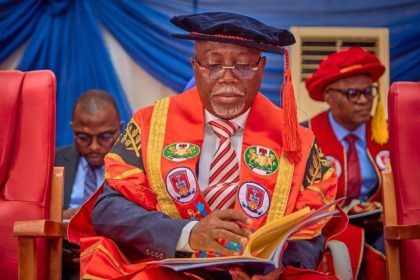By Adeyemi Adekunle
Nigerian football was thrown into mourning on Sunday, following the news of the death of former Green Eagles goalkeeper, Peter Fregene. Fregene, a revered figure in the nation’s sporting history, passed away after battling a prolonged illness, leaving behind a legacy that will be cherished for years to come.
His death was confirmed by former teammate and close friend, Segun Odegbami, who shared the heartbreaking news with the public. Odegbami revealed that Fregene, affectionately known as “Apo” for his agility and reflexes in goal, passed on in the presence of his devoted wife, Tina, and two of his children. Fregene had been on life support for the past week before he succumbed to his illness.
“A few minutes ago, Peter ‘Apo’ Fregene, OLY, former goalkeeper for Nigeria’s Green Eagles, who has been on life support for the past one week, passed on to meet his creator. He died quietly in the presence of two of his children and his devoted wife, Tina,” Odegbami wrote in an emotional statement on Sunday, reflecting the deep personal loss felt by the football community.
Fregene’s contributions to Nigerian football date back to the 1960s and 70s, when he stood as a pillar of strength for the Green Eagles, Nigeria’s national football team. His exceptional performances in goal earned him a place in the hearts of fans and teammates alike. Fregene represented Nigeria at the 1968 Olympic Games in Mexico, where his prowess in goal became evident on the international stage. His career was marked by bravery, skill, and a determination to safeguard the posts, which earned him the admiration of football enthusiasts nationwide.
Fregene’s nickname, “Apo,” meaning “bag” in Yoruba, was a tribute to his ability to “gather” shots effortlessly, reflecting his sharp reflexes and ability to prevent goals with ease. He became a formidable figure in Nigerian football during his era, and his presence on the field brought a sense of security to the team, even in the most difficult matches.
His passing has sparked an outpouring of tributes from former colleagues, football enthusiasts, and sports personalities. Odegbami, in his statement, extended gratitude to everyone who had supported Fregene during his final days, acknowledging the efforts made to keep the football icon alive.
“On behalf of all generations of Nigerian footballers, Olympians, sports persons, his family, friends, fans, and a few incredible Nigerians that quietly rallied round and, with their support, prayers, and the will of the creator of the Universe, kept him alive until this night, I say a big ‘thank you’,” Odegbami said.
Peter Fregene’s journey in football began during an era when the sport in Nigeria was still in its formative stages. Despite the lack of infrastructure and resources, Fregene’s determination and skill saw him rise to prominence. His legacy is not only defined by his achievements on the field but also by his enduring character and humility off it.
As news of his passing spread, many remembered Fregene as more than just a footballer. He was a symbol of perseverance and a reminder of the golden era of Nigerian football. His contributions laid the groundwork for future generations, and his presence will continue to be felt in the history of the sport.
While Fregene may have passed on, his legacy as one of Nigeria’s greatest goalkeepers will live on. The football community and the nation as a whole have lost a legend, but his memory will remain a source of inspiration for many who aspire to make a mark in Nigerian sports.
Peter Fregene’s life and career will be celebrated by those who knew him best and the generations that benefited from his contributions to football. The country bids farewell to a true icon, whose name will forever be etched in the annals of Nigerian sporting history.




